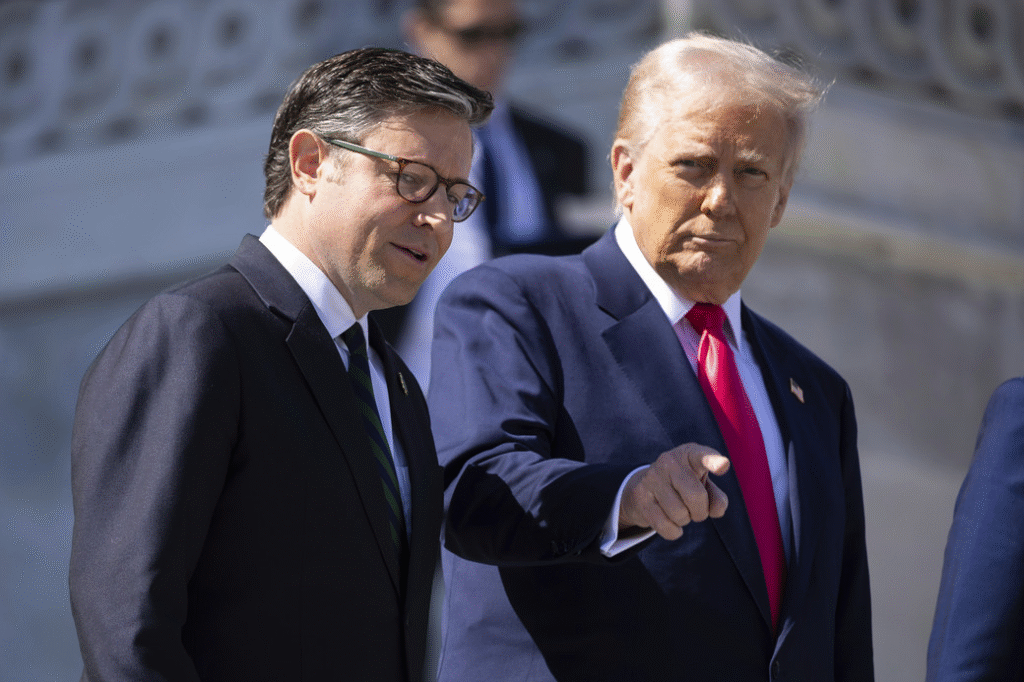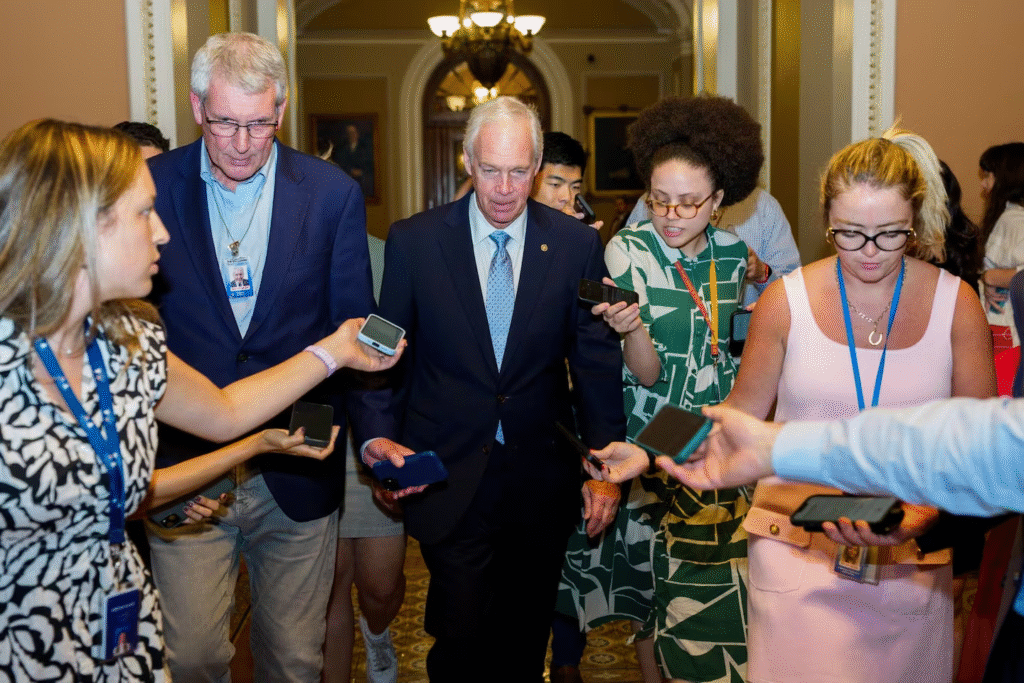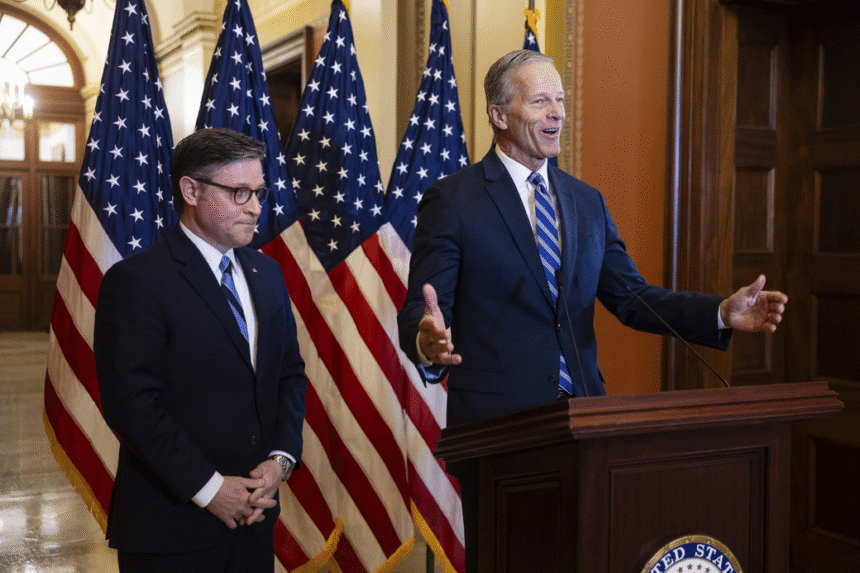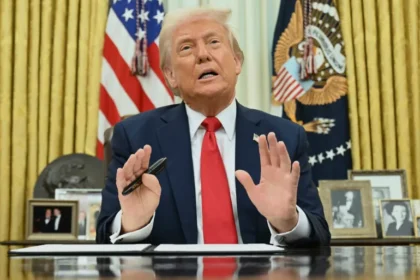Johnson Fights to Win Over GOP Holdouts on $1.5 Trillion Tax Bill
Fiscal hawks have concerns over the legislation’s ballooning price, and some moderate conservatives are uneasy about steeper cuts to Medicaid
House Republicans were on the cusp of handing President Donald Trump his second term’s first legislative victory Wednesday evening, but progress stalled as ultraconservative and moderate lawmakers dug in against the tax and immigration bill.

The $3.4 trillion legislation would extend tax cuts from Trump’s first term, implement campaign promises such as eliminating income taxes on tips and equipping border patrol and immigration enforcement agents with new, militarized capabilities.
Lawmakers spent Wednesday shuttlingbetweentalks with party leaders, Trump administration lieutenants and the president himself at the White House. But as Wednesday turned into Thursday morning, Johnson was still working to convince nine lawmakers to vote to advance the bill.
As talks dragged on, leaders left open two votes for hours — a sign of the Republican conference’s dysfunction and also the furious backroom dealing to get Trump’s agenda over the finish line.
“I’ll keep it open as long as it takes to make sure we’ve got everybody here and accounted for,” Johnson said on Fox News’s “Hannity.”
Johnson and Majority Whip Tom Emmer (R-Minnesota) worked the floor during the rule vote, holding what appeared to be tense conversations. Four Republicans voted against the rule, while nine others withheld their vote.
But Republicans remained dug in almost two hours after the vote was called. Fiscal hawks continued to have concerns over the ballooning price of the legislation, and some moderate conservatives remain uneasy about the even steeper cuts to Medicaid in the Senate version of the bill.

“There is about half a trillion dollars over the [House] framework. I think there are a number of people concerned, including myself, obviously,” said House Budget Committee Chairman Jodey Arrington (R-Texas). “We don’t want to add billions of dollars to the debt that our kids are going to have a hard time digging out of.”
While Trump appeared to have persuaded some lawmakers to support the bill, several remained stubbornly against it. Johnson can only lose three Republicans if all lawmakers are present and voting to send the One Big Beautiful Bill to Trump by the president’s arbitrary deadline.
Those with objections are mostly members of the ultraconservative House Freedom Caucus, but several in the moderate wing are also upset with the Senate’s product.
“It’ll be ongoing meetings [for hours]. The vote is going to be held up, and they’re going to keep that vote open for as long as it takes,” said Rep. Ralph Norman (R-South Carolina), a Freedom Caucus member who attended a meeting at the White House and remains undecided on moving the bill.
Republicans largely remain confident that the bill will pass, but some still need to be convinced. Rep. Greg Murphy (North Carolina), a rank-and-file conservative with concerns over the Senate bill’s steep Medicaid cuts, said he was “hoping to talk to the president” as the House waits on the next steps.
“We’re stalled,” Rep. Barry Loudermilk (Georgia) said moments after leaders decided to keep a floor vote open. “I feel that there’s some confidence that this gets done today.”
Republicans who had previously wavered seemed to be persuaded after their White House meetings with Trump. Rep. Jeff Van Drew (New Jersey), a pragmatic conservative, said he is leaning toward a yes following his conversations with Trump, which helped assuage his concerns over the bill — particularly regarding the bill’s limits on health care provider taxes. Rep. Don Bacon (Nebraska), a moderate who said he will not be seeking reelection next year, appeared poised to vote yes, saying he would find it hard to vote against making Trump’s 2017 tax cuts permanent.
Rep. Dusty Johnson (R-South Dakota), a supporter of the bill who attended a White House meeting, said “the president was masterful” in coaxing both moderates and conservatives. “He absolutely moved some minds in that room,” he said.
The Senate changes made the bill costlier; excluding borrowing costs, the House version would raise the national debt by $2.4 trillion over 10 years, while the Senate bill would increase it by $3.3 trillion.
To offset the cost, the legislation would cut about $1 trillion from Medicaid, the federal health insurance program for low-income individuals and people with disabilities, and other health care programs. It would also make cuts to SNAP, the anti-hunger Supplemental Nutrition Assistance Program, formerly known as food stamps. Nearly 12 million people will lose health care coverage if the bill becomes law, according to the nonpartisan Congressional Budget Office.
Republicans who support the bill said the legislation would help the working-class voters who swept Trump to the White House and the GOP to unified control of Congress in November’s elections.
“If we don’t take a different trajectory, these programs will collapse under the economic failures of prior administrations,” Rep. Mike Kennedy (R-Utah) said on the House floor.
The bill would increase the child tax credit and add a bonus to the standard deduction for seniors, a provision inspired by Trump’s campaign pledge to stop taxing Social Security benefits. It would also create savings accounts for newborns, seeded with $1,000 of taxpayer money, and it would allow buyers of American-made cars to deduct up to $10,000 in car loan interest.
But beyond those populist flourishes, the measure is regressive. The 10 percent of households with the lowest incomes would stand to be worse off by an average of $1,600 per year on average because of benefits cuts, according to the Congressional Budget Office’s analysis of the House version of the bill. The 10 percent of households with the highest incomes would be better off by $12,000 on average.

The legislation would make permanent a trio of corporate tax deductions that would make it easier for companies to invest in research and purchase new equipment.
Adding in the impact of Trump’s tariffs — which the White House has argued will help pay for the bill’s tax cuts and new spending — the bottom 80 percent of households would see their take-home incomes fall, according to the Yale Budget Lab.
The nearly $170 billion in the bill to fund the Trump administration’s border and immigration crackdown would be one of the largest sums ever spent on homeland security, and an additional roughly $160 billion would flow to the Defense Department, partially for Trump’s proposed “Golden Dome” continental missile defense system.
Read Also : IND vs ENG2nd Test 2025: Edgbaston Boundary Controversy – Bazball Boost or Strategy Twist








